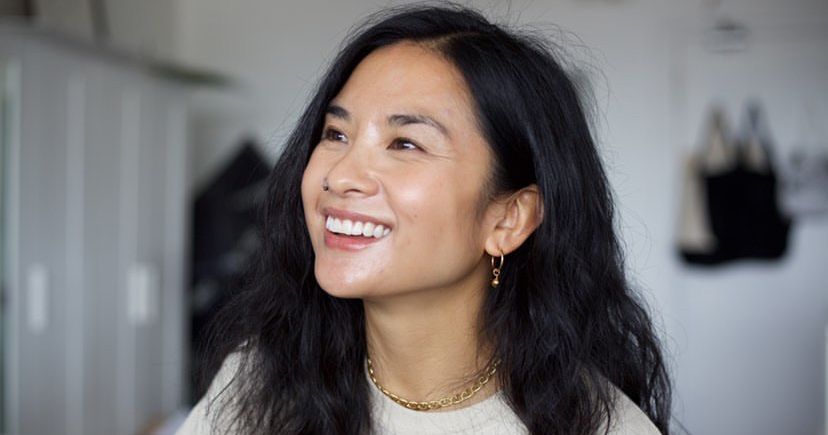If you’re a Toronto native, you’ve likely heard of Ruru Baked. The small batch ice cream brand is known for its Asian-inspired flavours and for instantly selling out of its pints on a weekly basis.
The business actually started as a side hustle for pastry chef Luanne Ronquillo while she was working at a content creation agency in Toronto. But when the agency closed its office in February 2020, she decided to take on Ruru Baked full-time.
“And then a month later, lockdown happened,” Ronquillo said. “I was very scared because I wasn’t getting paid by the agency anymore, and when they started rolling out income relief, self-employed people were not included at that time.”
The pandemic meant Ronquillo had to transition her business from scoop only pop-ups to pre-order pint pickups.
The first time her ice cream sold out, it happened within 10 minutes and Ronquillo was in disbelief. “Me and my husband were just like, ‘Holy shit!’” she said. “I remember I had made all these pints and I was just really tired and exhausted [from] the accumulated stress from the last couple of months. I hadn’t eaten all day. It was 10 p.m. So I was just eating a bowl of instant noodles at night, watching everything sell out. I almost cried. I was like, ‘Wow. It’s so cool that everyone wants to support me.’”
Ronquillo’s career journey has been a unique one. Although she graduated from pastry school, she only worked in the industry for two to three years before switching fields. Since then, she’s worked in a variety of roles, including a hair salon, an investment company, an accounting firm, luxury villa sales and a content creation agency before coming back full circle to pastry arts. Naturally, Ronquillo’s parents — who are Filipino and Singaporean — were thrilled she was finally putting her degree to good use with Ruru Baked.
As someone who immigrated from Singapore to Ontario, but spent most of her youth in Calgary before moving to Toronto, Ronquillo has learned a lot about embracing her Asian culture. Below, she talks to The RepresentASIAN Project about overcoming her childhood embarrassment of being Asian and how she fell in love with Asian cuisine.
On how she unintentionally fell into pastry arts because of her parents’ expectations
I feel like for Asian parents, especially the older Boomer generation, [the mentality is] you don’t take a year off after high school. You go straight into something. But I wanted to travel and wait to figure out what I wanted to do before my parents spent any money on me or [before] I got out a student loan [but my parents said,] “No, you have to take something.” So I was like, “Okay. I’m going to take the easiest thing possible.”
I was always really into Martha Stewart and being really skilled domestically. It’s really weird but I think it’s because I’ve always wanted to be independent. I [also] really liked gadgets and kitchen stuff, but to be quite honest, I didn’t have a passion for pastries. I didn’t know what I wanted to do out of high school and my parents weren’t happy about it.
My mom, at the time, was a travel agent, and that was the career she was really stoked [about]. So I was going to follow in her footsteps and go into hotel and restaurant management but then at the last second, I thought, I don’t want to do this at all. So I went through the course guide and picked the thing that had the least amount of prerequisites and the least amount of time in school, which was baking and pastry arts.
My dad was like, “Why are you going into baking? You won’t make any money!” But I ended up being really good. I graduated on the Dean’s List. I won a bunch of awards at graduation and won a bunch of competitions as well. So my parents were super happy and proud that I was winning things. But [becoming a pastry chef] was never a passion of mine. I just went into it because I didn’t really want to go to school.

On not having Asian role models in the food industry
I don’t remember any Asian people that were in [pastry arts]. I always looked up to white people like Anna Olsen or Martha Stewart. I don’t ever remember seeing an Asian [chef on TV] other than [Martin Yan from] “Yan Can Cook.” On the Food Network, everyone else was white, or occasionally black.
So I never looked up to anybody that was Asian in the food world, especially when I started [my career] because I went to school in 2004, 2005 and we didn’t have social media back then. It was whatever was on TV and there was no representation.
On why she didn’t think it was “cool” to be Asian growing up
It’s a very geographical thing [for me]. Growing up in Ontario until the age of 10, we were surrounded by a lot of Asian people — lots of Koreans, a lot of Filipinos, a lot of family gatherings with food from our heritage.
I definitely feel like Ontario is more multicultural than Calgary, so I was happy to be Asian in Ontario. At the time, my mom put me in a lot of commercials, acting and kid modelling, so I would see a lot of kids that looked like me in commercials or who would get [screen] tested with me. That was cool, but the moment we moved to Calgary where it’s predominantly white people, I was the only Asian person in my elementary school.
I’m sure every Asian person has dealt with this, but I hated bringing my lunch to school. I just wanted a pizza pop or anything that wasn’t leftover rice. I remember my mom didn’t love making lunch, so sometimes she would just give me Wonder Bread with margarine and dried pork floss and make that a sandwich. I remember people would always be like, “What is that? Why is your meat hairy?” So usually I’d eat my lunch on the way to school and be hungry all day.
So when I moved to Calgary, I didn’t want to be Asian. But now that we’ve moved back to Toronto, this is where I’m truly embracing my heritage. It’s finally cool, when back in Calgary, it wasn’t.
“Being able to share [my cultures and heritage] through platforms like social media or through the business has been super helpful. And just not caring [what people think] anymore. Now when I bring lunch to work, I don’t worry if it smells weird.”
On how she continues to celebrate her Asian heritage
Being able to share [my cultures and heritage] through platforms like social media or through the business has been super helpful. And just not caring [what people think] anymore. Now when I bring lunch to work, I don’t worry if it smells weird.
When I was back in Calgary and working at an accounting firm, I would heat up my lunch and then I’d go sit in my office, lock the door, and open the window to make sure it [didn’t] stink. But now that I’ve been in Toronto, I don’t have that fear that somebody’s going to judge me because my food smells funny or whatever. I think you have to be accepting of other cultures now. I don’t think there’s room to not be accepting of other cultures, [and that’s] a good thing.
On using Asian-inspired flavours to differentiate her ice cream at Ruru Baked
When I started, there were only a couple of places [in Toronto] that I knew of that were really doing Asian-inspired flavours: Wong’s [Ice Cream & Store] and Kekou Gelato. So I saw them doing Asian flavours, [but] I was also friends with a lot of people who didn’t live in Toronto or Canada. They lived in Hong Kong or Singapore and posted all this content about these other flavours of ice creams and foods that we didn’t have here. So [my Asian-inspired ice cream] was from A) wanting to fulfill my own cravings and B) not seeing that representation very well in Toronto, even though we’re such a multicultural city. But now I feel like there’s a lot.
On how she fell in love with Asian cuisine
I would say traveling and just having an adventurous family when it comes to eating [helped me develop my palate for Asian cuisine]. My parents love to eat. My father’s Filipino and my mom’s Singaporean, so we’ve been exposed to a lot of different types of food [in my family]. We were never taught to be afraid to eat anything. My mom’s also a lot like me. Anytime any restaurant opens up, she wants to go there. She’s very adventurous. She’s introduced me to Ethiopian food, [for example].
I feel like [Asian] flavour profiles are so interesting and [in Asian cuisine] they turn things into sweets that you wouldn’t normally think to turn into sweets. [Plus,] they have a lot of different textures. In American food, desserts especially, it’s a lot of flour, a lot of cakey, cookie things, and laminated doughs like puff pastries. Then when you go to Asia, it’s glutinous rice, squishy things and I think it’s really cool and that you can have that as a dessert. I just love exploring [desserts beyond] butter, sugar, flour.
On why giving back to the community is ingrained in Ruru Baked’s mission
[Charity work] has always been part of my adult life. I try to volunteer when I have time or donate to charities. I never really made a ton of money throughout my career, so donating wasn’t always a possibility. I knew that when I had my own business and we could afford to donate, I wanted to do that because it honestly just felt greedy for me to have a business and make all this money. [It’s] not that we make tons of money, but we’re making enough that we can give some of it away, so why shouldn’t we do that? If we have the extra cash, I would like to get it to people that need it instead of hoarding it for ourselves. And there’s a lot of amazing causes out there.
Whenever I feel like we’re ready to donate or support a cause, I’ll do some research to make sure that the money [we’re] giving is actually being used in the way that [the organization says] it’s being used. I [also] do a lot of research to make sure we’re aligned values-wise.
I feel like all [the organizations we’ve donated to are] a little bit personal to me. But the most personal would definitely be the Asian Mental Health Collective. I found my therapist through their website, so they’re a really cool resource and I wanted to support them. Legacy of Hope was also a cool foundation. It wasn’t necessarily personal, but I just really believe in what they do. They just try to bring more awareness to residential schools.
Like this post? Follow The RepresentASIAN Project on Instagram, TikTok and YouTube to keep updated on the latest content.











